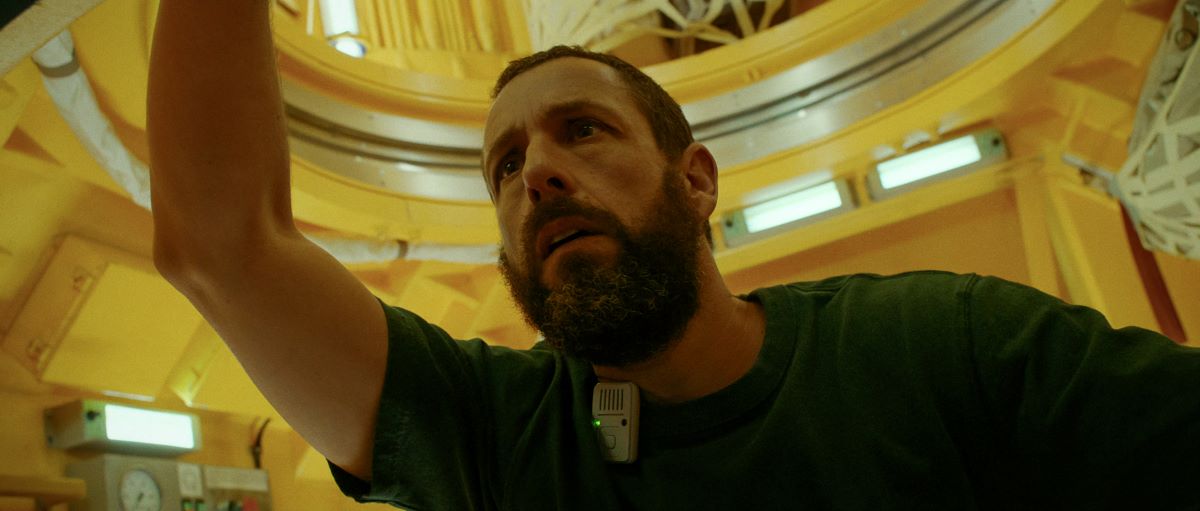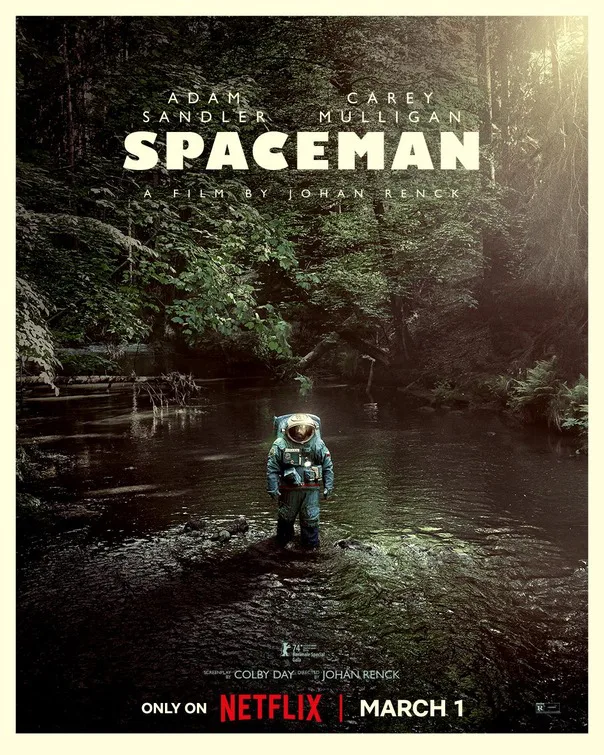Now, 189 days into his mission, Jakub Prochazka (Adam Sandler), the forlorn cosmonaut protagonist of “Spaceman,” is hurtling toward Jupiter to study the mysterious Chopra cloud. He is nearing his breaking point. Short on sleep in a malfunctioning spacecraft that has seen better days, what’s really occupying his mind isn’t the mission at hand — it’s the radio silence by his pregnant wife Lenka (Carey Mulligan). Despite efforts by his physician Peter (Kunal Nayyar) and Commissioner Tuma (an under-used Isabella Rossellini) at Mission Control to calm his fears, Jakub knows something is wrong. When a giant primordial spider named Hanus (voiced by Paul Dano) appears in his spacecraft, Jakub doesn’t know if the arachnid is real or a figment of a tired, desperate imagination. With the spider’s help, Jakub may just learn the secrets of the universe and of himself.
With director Johan Renck’s “Spaceman,” which had its World Premiere at the Berlin International Film Festival, a surprisingly subdued Sandler takes a swing at the sad boy space odyssey genre. These are films — “Ad Astra” and “First Man” — about stoic men who use a journey to the outer limits to resist confronting homegrown tragedies involving their children or their own long time daddy issues. Indeed, some men would rather go to space and talk to a giant spider than go to therapy. With Hanus, Jakub does initiate a kind of therapy, talking through his harsh childhood memories and present insecurities in a ruminative space film that is short on majesty but long on empathy.
The first half of “Spaceman,” however, is a chore. We are mostly confined to the cramped surroundings of the spacecraft; the only time we leave its restrictive interior is whenever Hanus probes Jakub’s memories to discover why this “skinny human,” as he lovingly calls him, is so depressed. These flashback sequences are shot by DP Jakob Ihre from the perspective of a spider, oblique and reflective, but nauseatingly limited in their capacity for composing informative frames to give us more than the equally narrow dialogue is providing. The images of space, no matter what the ethereal score is trying to sell, are also quite flat, looking more like purple sludge clouds than awe inspiring remnants of the galaxy’s beginning. The script’s dialogue, adapted from Jaroslav Kalfař’s sci-fi novel Spaceman of Bohemia is rendered repetitively: For a while it sounds like Mulligan’s only lines will be “Where you go, I go.” But then the film finds its rhythm.
Sandler is quite different here than even his previous dramatic turns like “Uncut Gems” or “The Meyerowitz Stories.” There’s nary a loud outburst or a flash of uncontrollable rage. Sandler’s uncommon ability to mine dramatic grace notes from raw emotion has always been his best tool. So it’s initially a bit perplexing to see that hammer worn down, so to speak. That quiet melancholy is intended. Jakub isn’t really a likable guy. Still consumed by the traumatic memory of witnessing the death of his communist informant father — we’re supposed to believe Sandler and nearly the entire space team hails from the Czech Republic — he struggles to open up and to think of Lenka’s needs. Sandler’s sunken face, his exhausted mien and his rigid body lands the character even if we’re never totally sure why Lenka was ever attracted to him.
Despite the dour tone and grim lighting, “Spaceman” does consciously maintain a silly air. I mean, it’s Sandler in space with a giant spider, it must have a few jokes. Some hilarious bits arise from Jakub’s depression being so overwhelming it causes the spider to feel it too, ultimately forcing the arachnid to turn to snacks to quell the sad vibes. But other funny moments naturally evolve from Dano’s low-key voice work. There is a heaviness to his presence, the kind you expect from a spider who might date back to the beginning of the universe. There’s also a vulnerability and sense of a charity that not only endears the character to Jakub, but to the viewer too. Together man and arachnid, two withdrawn beings finding friendship in one another, are a winning pair, to the point that a hug between them engenders both laughs and warmth.
There are plenty of flaws in “Spaceman.” Mulligan’s character is underwritten — we don’t know what she does for a living or if she has her own dreams or aspirations, which might partially be the point. But the lithe script asks the actress to do some heavy lifting that in a lesser performer’s hands would simply crumble. With Mulligan, there is a tangible inner life in spite of the material. The overall tone might also be too sleepy, too introspective and despondent to some’s liking. But I just love Sandler in this register. It’s no longer a surprise when he pulls a well-defined and memorable dramatic performance. It’s become the norm. And in a ruminative film like “Spaceman,” which is about learning to move on, to care for another, and to redefine yourself before it’s too late, then it’s fitting that the idea of “the Sandman in space” isn’t reduced to a cheap tagline, but actually means something real and genuine is about to occur.
This review was filed from the Berlin Film Festival. It opens in limited release on February 23rd before landing on Netflix on March 1st.




















